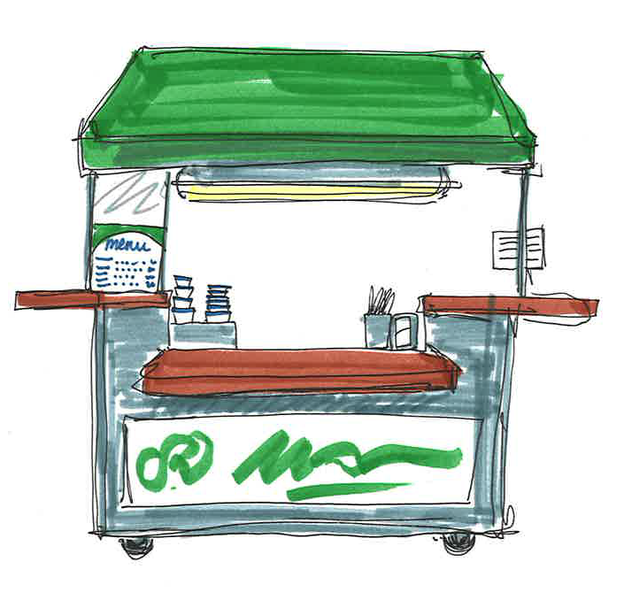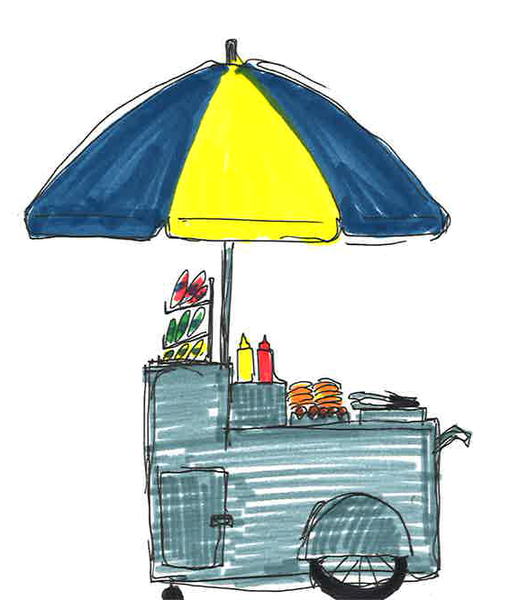After decades of operating in fear of the law, pushcart food vendors across Chicago now have the opportunity to legalize their businesses. When the City Council convened on September 24, aldermen voted unanimously to update the existing vendor license, which previously was available only for food trucks and vendors selling frozen desserts and uncut produce, to include pushcart vendors as well. This made Chicago the second largest city in America to legalize pushcarts.
Vendors and their legal advocates—the Asociación Vendedores Ambulante (AVA), the Institute for Justice Clinic at the University of Chicago, and the Street Vendors Justice Coalition—celebrated the long-awaited license after the conclusion of the council meeting. Pushcarts have been community staples for decades, especially on the South and West Sides of Chicago, providing afterschool elote as well as the early morning tamale for early-risers who set off for work before the nearest corner store opens. Vendors had also long been subject to the city’s erratic enforcement of street vending law, enforcement that varied in extremity depending on the neighborhood: some have seen upwards of five fines for selling food without a license, while some have received none at all.
Beginning in November, with a two-year license that costs $350, pushcart vendors will be allowed to sell food and drink that has been prepared and pre-wrapped in a licensed kitchen from 5am until 10pm and under the conditions that they keep their products at appropriate temperatures, meet health department standards, and change location every two hours.

The new license is expected to generate over 6,000 new jobs, up to 8.5 million dollars in local sales tax revenue, and forty to 160 million dollars in total annual sales according to the Illinois Policy Institute.
According to a survey conducted by the Institute several years ago, seventy-nine percent of vendors surveyed said they would expand their business if pushcart vending were legalized, and sixty-four percent said they would be interested in expanding their business by adding more carts. However, it is likely that at least some surveyed vendors did not take into account the price of cart upgrades that would be required in the event of pushcart vendor legalization.
Many of the carts currently in use do not meet the standards set by the new ordinance—carts must have smooth, non-porous surfaces with heating and cooling capacities—and most vendors cook their food not at a licensed kitchen, but at home. As there are few licensed kitchens on the South Side and carts tend to cost upwards of $3,000, the new standards present something of a hurdle to vendors, who on average make a profit of $328 per week —around $11,150 per year.
Vicky Lugo, vice president of the AVA, says that the AVA is currently working to help improve and increase resources for current and future vendors.

“There are very few [licensed] kitchens available, but we are in the process of expanding a kitchen in a church,” Lugo says. “We are also trying to open more kitchens and [are] working with restaurants, churches, banquet halls, or any other place that has a registered kitchen. On the South Side there are no shared kitchens, but there are some that exist as private catering businesses that could get a shared kitchen operator license.”
Beth Kregor, director of the Institute for Justice Clinic on Entrepreneurship, says they are thrilled that the law passed, but that they will continue to advocate for the licensure of a wide variety of vendors, including those who prepare food on their carts. “In major cities around the country, vendors may do at least some food preparation—if not all-out cooking—on a cart.”
Kregor said that in the meantime, the IJC will monitor the vendor licensing process “to make sure it is clear and consistent,” and work closely with community groups interested in opening licensed kitchens.
Lugo also said that the AVA was looking into forming a cooperative in order to buy carts in bulk and directly from the providers, thereby hopefully reducing the overall cost to each vendor. She said another option would be for vendors to lease carts or to take out a small business loan to finance a first cart.
Upon the passage of the new license, Alderman Brendan Reilly moved to propose thirty-one no-peddle zones downtown, citing concerns about public safety and traffic congestion in the Loop’s busier areas. Alderman Tom Tunney of the 44th Ward, a large proponent of curbside cafés, also expressed concerns about congestion on Clark Street.
Kregor expressed disappointment at Alderman Reilly’s movement, saying that it is “a shame that some aldermen jump to the conclusion that vendors are problems instead of assets for their communities,” and that before banning them in any specific area, the law requires City Council to determine that the vendors’ presence is actually creating safety problems.
Lugo also expressed concerns about the clause requiring vendors to move their carts every two hours given that they often need assistance transporting them to and from their homes. Both the Illinois Policy Institute and the IJC have also spoken out against the two-hour limit that is in place for all mobile vendors, recommending that they either remove the over-regulating limits entirely or leave them to be determined by each ward’s alderman. It is unclear whether the AVA and the IJC were planning to take action to have the clause changed.

Although impediments do remain for pushcart vendors, the legitimization of an estimated two thousand businesses across Chicago, businesses that provide thousands of meals every day and a livelihood for many, is an excellent first step. With continuing support from the AVA and the IJC, making the changes to meet the new standards may become less daunting for vendors within the next few years.
Free licensing workshops for vendors are available in Spanish from the Department of Business Affairs and Consumer Protection, and the AVA continues to host weekly meetings for vendors at 2857 S. Christiana Ave. on Wednesdays from 12pm-2pm.
Correction: An earlier version of this post quoted Vicky Lugo, instead of Beth Kregor, as saying that in the meantime, the IJC will monitor the vendor licensing process “to make sure it is clear and consistent.”



